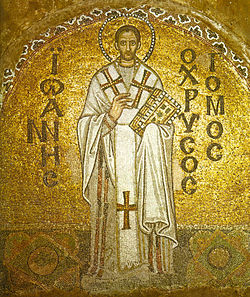Given the nickname “Golden Mouthed,” St. John “Chrysostom” was a well-known preacher and Archbishop of Constantinople during the second part of the 4th century. His sermon on John 3:16 is just as powerful after 1,600 years, perhaps even more so given our increased individual and societal wealth. Jesus’ message hasn’t changed or become more palatable over the millennia:
“God so loved the world that He gave His Only-begotten Son, that whosoever believes in Him should not perish, but have everlasting life.”
What He says, is of this kind: Marvel not that I am to be lifted up that you may be saved, for this seems good to the Father, and He has so loved you as to give His Son for slaves, and ungrateful slaves. Yet a man would not do this even for a friend, nor readily even for a righteous man; as Paul has declared when he said,Scarcely for a righteous man will one die. (Romans 5:7) Now he spoke at greater length, as speaking to believers, but here Christ speaks concisely, because His discourse was directed to Nicodemus, but still in a more significant manner, for each word had much significance. For by the expression, so loved, and that other, God the world, He shows the great strength of His love. Large and infinite was the interval between the two. He, the immortal, who is without beginning, the Infinite Majesty, they but dust and ashes, full of ten thousand sins, who, ungrateful, have at all times offended Him; and these He loved. Again, the words which He added after these are alike significant, when He says, that He gave His Only-begotten Son, not a servant, not an Angel, not an Archangel. And yet no one would show such anxiety for his own child, as God did for His ungrateful servants.
His Passion then He sets before him not very openly, but rather darkly; but the advantage of the Passion He adds in a clearer manner, saying, That every one that believes in Him. should not perish, but have everlasting life. For when He had said, must be lifted up, and alluded to death, lest the hearer should be made downcast by these words, forming some mere human opinions concerning Him, and supposing that His death was a ceasing to be, observe how He sets this right, by saying, that He that was given was The Son of God, and the cause of life, of everlasting life. He who procured life for others by death, would not Himself be continually in death; for if they who believed on the Crucified perish not, much less does He perish who is crucified. He who takes away the destitution of others much more is He free from it; He who gives life to others, much more to Himself does He well forth life. Do you see that everywhere there is need of faith? For He calls the Cross the fountain of life; which reason cannot easily allow, as the heathens now by their mocking testify. But faith which goes beyond the weakness of reasoning, may easily receive and retain it. And whence did God so love the world? From no other source but only from his goodness.
Let us now be abashed at His love, let us be ashamed at the excess of His lovingkindness, since He for our sakes spared not His Only-begotten Son, yet we spare our wealth to our own injury; He for us gave His Own Son, but we for Him do not so much as despise money, nor even for ourselves. And how can these things deserve pardon? If we see a man submitting to sufferings and death for us, we set him before all others, count him among our chief friends, place in his hands all that is ours, and deem it rather his than ours, and even so do not think that we give him the return that he deserves. But towards Christ we do not preserve even this degree of right feeling. He laid down His life for us, and poured forth His precious Blood for our sakes, who were neither well-disposed nor good, while we do not pour out even our money for our own sakes, and neglect Him who died for us, when He is naked and a stranger; and who shall deliver us from the punishment that is to come? For suppose that it were not God that punishes, but that we punished ourselves; should we not give our vote against ourselves? Should we not sentence ourselves to the very fire of hell, for allowing Him who laid down His life for us, to pine with hunger? But why speak I of money? Had we ten thousand lives, ought we not to lay them all down for Him? And yet not even so could we do what His benefits deserve. For he who confers a benefit in the first instance, gives evident proof of his kindness, but he who has received one, whatever return he makes, he repays as a debt, and does not bestow as a favor; especially when he who did the first good turn was benefiting his enemies. And he who repays both bestows his gifts on a benefactor, and himself reaps their fruit besides. But not even this induces us; more foolish are we than any, putting golden necklaces about our servants and mules and horses, and neglecting our Lord who goes about naked, and passes from door to door, and ever stands at our outlets, and stretches forth His hands to us, but often regarding Him with unpitying eye; yet these very things He undergoes for our sake. Gladly does He hunger that you may be fed; naked does He go that He may provide for you the materials for a garment of incorruption, yet not even so do you give up any of your own. Some of your garments are moth-eaten, others are a load to your coffers, and a needless trouble to their possessors, while He who gave you these and all else that you possess goes naked.
But perhaps you do not lay them by in your coffers, but wear them and make yourself fine with them. And what gain you by this? Is it that the street people may see you? What then? They will not admire you who wearest such apparel, but the man who supplies garments to the needy; so if you desire to be admired, by clothing others, you will the rather get infinite applause. Then too God as well as man shall praise you; now none can praise, but all will grudge at you, seeing you with a body well arrayed, but having a neglected soul. So harlots have adornment, and their clothes are often more than usually expensive and splendid; but the adornment of the soul is with those only who live in virtue.
These things I say continually, and I will not cease to say them, not so much because I care for the poor, as because I care for your souls. For they will have some comfort, if not from you, yet from some other quarter; or even if they be not comforted, but perish by hunger, the harm to them will be no great matter. What did poverty and wasting by hunger injure Lazarus! But none can rescue you from hell, if you obtain not the help of the poor; we shall say to you what was said to the rich man, who was continually broiling, yet gained no comfort. God grant that none ever hear those words, but that all may go into the bosom of Abraham; by the grace and lovingkindness of our Lord Jesus Christ, by whom and with whom, to the Father and the Holy Ghost, be glory for ever and ever. Amen.









